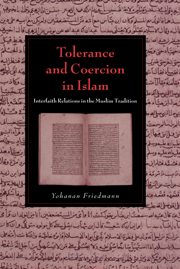Book contents
- Frontmatter
- Contents
- Preface
- Introduction
- 1 Religious diversity and hierarchy of religions
- 2 Classification of unbelievers
- 3 Is there no compulsion in religion?
- 4 Apostasy
- 5 Interfaith marriages
- 6 Concluding observations
- Selected Bibliography
- General Index
- Index of Qurʾānic verses
- Index of prophetic traditions
Introduction
Published online by Cambridge University Press: 10 August 2009
- Frontmatter
- Contents
- Preface
- Introduction
- 1 Religious diversity and hierarchy of religions
- 2 Classification of unbelievers
- 3 Is there no compulsion in religion?
- 4 Apostasy
- 5 Interfaith marriages
- 6 Concluding observations
- Selected Bibliography
- General Index
- Index of Qurʾānic verses
- Index of prophetic traditions
Summary
Since the very beginning of its long and chequered history, Islam has encountered various religious communities both in the area in which it emerged, and in the vast territories which it conquered during the period of its phenomenal expansion. The most distinctive characteristic of these encounters was the fact that Muslims faced the other religions from the position of a ruling power, and enjoyed in relation to them a position of unmistakable superiority. They were therefore able to determine the nature of their relationship with the others in conformity with their world-view and in accordance with their beliefs. Barring the earliest years of nascent Islam in Mecca, the first two or three years in Medina, the period of the Crusades in certain regions and a few other minor exceptions, this characterization holds true for the pre-modern period of Islamic history in its entirety. Islam formulated toward each community that it faced a particular attitude, which was shaped by the historical circumstances in which the encounter took place, and was influenced to a certain extent by the nature of the respective non-Muslim religious tradition.
These attitudes were intimately related to the matter of religious tolerance or intolerance and interfaith relations between Muslims and others. This was a prominent theme in the Muslim tradition since the early period of Islam. It was extensively discussed in Qurʾānic exegesis, in the various collections of ḥadīth and in the literature of jurisprudence throughout the medieval period.
- Type
- Chapter
- Information
- Tolerance and Coercion in IslamInterfaith Relations in the Muslim Tradition, pp. 1 - 12Publisher: Cambridge University PressPrint publication year: 2003



